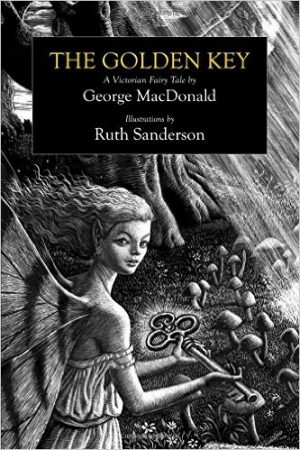This is a very famous book, not quite children’s fairy tale and not quite adult allegory—or rather, it’s both, and more. As fairy tale and as allegory, it has so light a touch as to be ethereal, combined with a feeling of enormous substance. There is, for child or adult, little obvious moral, yet the reader is left with a feeling of transcendence. Quite an accomplishment in what is really just a short story, and doubtless why the book is still famous today.
I read this book to my children, because I remembered my mother reading us MacDonald when I was young. I vaguely recall this book, but I remember the Curdie stories (e.g., “The Princess and the Goblin”) better, perhaps because the happenings there are more concrete. That I remember MacDonald’s stories at all suggests they are particularly memorable.
MacDonald was that oddest of creatures, a Calvinist who believed in Christian Universalism (the doctrine of apocatastasis, of universal reconciliation to God as the ultimate destiny of all people). To put it mildly, this is not the traditional Calvinist view, which follows Augustine and opposes Clement of Alexandria and Origen. The nature of universalism, of course, is that it tends to erode any coherent adherence to basic Christian doctrines; like Antinomianism, it contains within itself the seeds of its own destruction. In effect, universalism is the creed of most modern Christians, although without reflection or sophistication. But in MacDonald’s hands, it was a coherent doctrine, if not a popular one with his parishioners.
None of this is explicit in The Golden Key, although certainly some elements can be read into it. While as far as I know Macdonald didn’t comment much if at all on the meaning of his book, it seems likely it was inspired by lines from Milton’s Comus: “Yet some there be that by due steps aspire / To lay their just hands on that golden key / That opes the palace of Eternity”—and “I took it for a faery vision / Of some gay creatures of the element / That in the colours of the rainbow live.”
On the surface, this is the story of a boy and a girl. Not all that much happens; much of the book is taken up with beautiful descriptions. The boy finds a golden key at the end of a rainbow, which he can reach because he lives on the borders of Fairyland, where things happen differently. The girl, initially separate from the boy, flees into the same forest the boy is in, impelled by fairies who are semi-hostile, and together they travel onwards, as directed by an ageless, fey woman. From there the story becomes odder, involving flying fish cooked and eaten, transubstantiating them into flying fairies, called aeranths; the separation of the boy and the girl in a sea of substantial shadows cast from an unseen land they become desperate to reach; and their separate interactions with three characters of increasing age: the Old Man of the Sea, the Old Man of the Earth, and the Old Man of Fire—this last a baby who plays with colored spheres that convey enormous but opaque meaning to the watcher. Ultimately, the golden key allows the boy and the girl, who seem to have both aged, died and been reborn during the story, to enter the rainbow itself, together with multitudinous other creatures, ascending.
None of this is a clear allegory. Presumably the “land whence the shadows come” is Heaven. Maybe the three Old Men are the Trinity. Other aspects of the story seem to echo elements of Greek mythology. To me, the main effect, as I say, is transcendence. The reader is left not with the feeling of having read a story, but of having, however dimly and from however far away, glimpsed the Absolute and Infinite. And that is no small thing.

